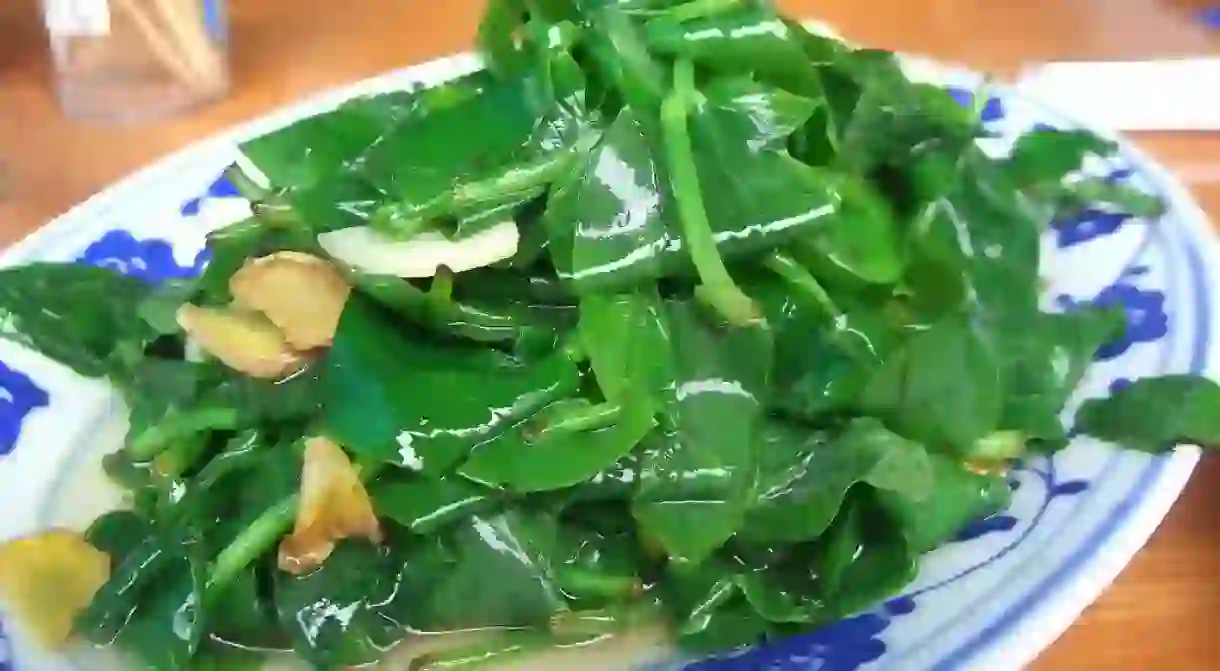The Best Vegetarian and Vegan Restaurants in Shanghai, China

While Chinese dishes are often rich in vegetables and do not feature meat in the same way Western dishes do, vegetarians and vegans can still have a difficult time explaining that their diet does not include fish, pork stock, or a meat garnish sprinkled atop noodles. However, China does have both a history of Buddhist cuisine and a renewed interest in maintaining a healthy lifestyle. This has led to a growing population of excellent vegan and vegetarian-friendly restaurants blooming in Shanghai. Here are some of the best.
Wuguan Tang (五观堂素食)
Restaurant, Chinese
This elegant, serene restaurant has been a mainstay on the Shanghai vegetarian scene for years. On the seasonal, handwritten menu, you’ll find lovely vegetable dishes that look simple on the surface, but shine in their thoughtful creation. Roasted scalloped potato (kǎo tǔdòu, 烤土豆) is an iconic example, the spud cooked to mellow sweetness and driven to new heights with a golden crust. The space itself feature elegant dark wood tables and low ceilings, creating an intimate environment that fits the food.
Godly Vegetarian Restaurant (功德林)
Restaurant, Chinese
By far Shanghai’s most historical vegetarian restaurant, Godly was founded in 1922 and became famous for mixing both Buddhist and Huaiyang influences into their menu. It also attracted influential personalities throughout history, including Lu Xun, the father of modern Chinese poetry. Today, it has become a small chain, but its branch on West Nanjing Road remains its most popular. Its most famous dishes include a take on “crab” fried in butter (huángyóu xièfěn, 黄油蟹粉) and wheat gluten cooked with black wood ear mushrooms (sì xǐ kǎo fū, 四喜烤麸).
Fu He Hui (福和慧)
Restaurant, Chinese
Fu He Hui is an upscale establishment that elevates vegetables to fine dining status. Chef Tony Lu is the mind behind the magic, a Shanghai native more known for his refined takes on the sweet, traditional cuisine of his hometown at restaurants like Yongyi Ting at the Mandarin Oriental and Fu 1015. Here, you’ll find an ode to Earth’s bounty in two different eight-course tasting menus. Think simple, but incredibly beautiful dishes that reflect concentration and clarity. So impressive is Chef Lu’s work, Fu He Hui was awarded a Michelin star in 2017, so make sure to make reservations well in advance.
Vegetarian Lifestyle (aka Jujube Tree/枣子树)
Restaurant, Chinese
If you’re one of those vegetarians that miss meat (or if you happen to be with diners who have carnivore-like tendencies), Vegetarian Lifestyle is a good middle ground. This small chain specializes in the art of “fake meat” made entirely of tofu or seitan, manipulated in such creative ways that some of the dishes are incredibly similar to their meat counterparts. Try the spicy numbing bamboo pot (málà zhú sūn, 麻辣竹荪) and spinach dumplings (bōcài jiǎozi, 菠菜饺子). A note, this restaurant is known both as Vegetarian Lifestyle and Jujube Tree (a direct translation of its Chinese name, Zǎozǐ Shù, 枣子树), and the names are used interchangeably.
Dashu Wujie (大蔬无界)
Restaurant, Chinese

This is the upscale sister brand to Vegetarian Lifestyle, and is notably more ambitious in both atmosphere and cuisine. The restaurant on Tianping Road is a particularly lovely space, all open windows and curved surfaces, set on the edge of the expansive Xujiahui Park. On the menu is melding of Chinese and Western flavors—though it’s best to stick more to the former. Crispy lotus root (Ǒu hé, 藕合) and tofu dishes are standouts. There is also a more upscale version on the Bund, in which every floor is designed after one of the five Chinese elements—as this one was awarded a Michelin star, reservations are recommended.
Lucky Zen (A.K.A. Jixiang Cao/吉祥草)
Restaurant, Chinese
Radiating the aroma of sandalwood, Lucky Zen is a dining spot of some pedigree, featuring a spacious, comfy, and quiet dining atmosphere where Guzheng music (a type of Chinese zither) tinkles lightly in the background. The food itself is often based around Buddhist principles, and refreshingly features a lot of vegetables instead of imitation meats. Try the black pepper mushrooms (hēi jiāo mò yù, 黑椒墨玉) and the sour and spicy cold fern root noodles (suān là jué gēn fěn, 酸辣蕨根粉), which both awaken the tastebuds with a melange of spices and textures.
Yan Gege (焱格格)
Restaurant, Healthy, Chinese
When the weather turns chilly, there’s nothing more delicious than a hot pot gathering with friends. For a delicious rendition that definitely has no bones in the stock, head to Yan Gege. Owned by prominent Hong Kong actor and animal rights activist Lü Songxian, no meat gets anywhere near the premises. The Beijing-style hot pot features a range of fresh tofus, vegetables, and a huge selection of mushrooms, just waiting to be cooked in the clear, consomme-like broth.
Pure & Whole
Restaurant, North American, Asian, European
For more Western vegetarian fare, head to Pure & Whole, which takes the whole ethos of vegetarianism to heart. You’ll find lots of whole grains, power foods, pulses, and lentils put together in healthful salads, sandwiches, and clean soups. There are two locations around town, both usually buzzing and featuring clean lines and blonde wood. You’ll leave feeling more nourished than when you went in.
Sproutworks
Restaurant, North American
While not only solely the domain of vegetarians, Sproutworks is a great spot where vegetarians and omnivores alike can grab a quick lunch or dinner. The spot features a range of pre-made salads in display cases, showcasing lots of kale, radishes, broccoli, edamame, and more. There are also soups, paninis, and fresh-pressed juices along with a weekend brunch.













